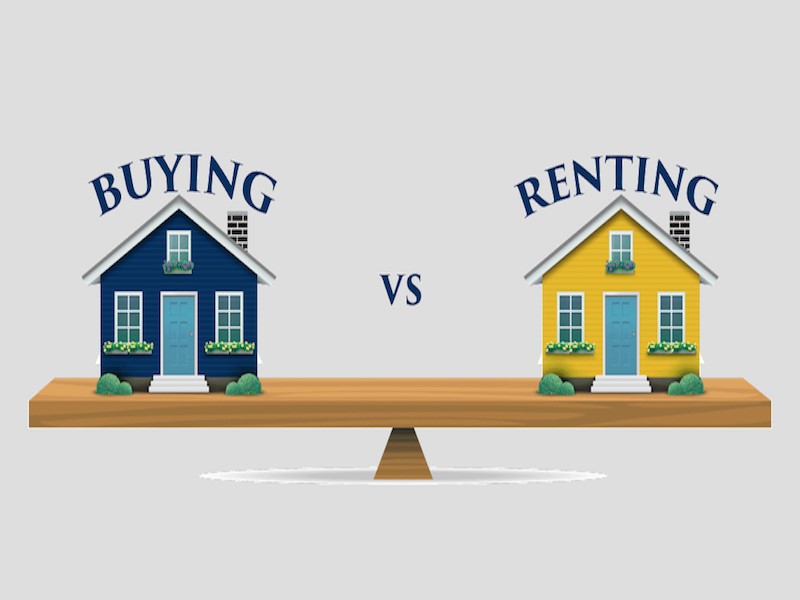Deciding whether to rent or buy a home can be as difficult as deciding whether to pursue a career or a hobby.
Both are life-changing decisions that totally depend on your financial conditions and the ongoing circumstances of your life.
Whether you buy a home or rent one, you should be aware that both situations have their own advantages and drawbacks.
Deciding whether to rent or buy a home is a significant life choice that can have profound and long-lasting implications for your financial stability and lifestyle.
It is not a decision to be made lightly, and it requires careful consideration of various factors to ensure you make the best choice for your situation.
Here, you should take the time to evaluate the pros and cons of each option, seek professional advice if needed, and make an informed decision that aligns with your unique preferences and aspirations.
Pros of Buying
Building Equity
One of the most significant advantages of buying a home is the opportunity to build equity over time, especially if you are buying a house in a reputable place like Nova City in Peshawar, where real estate is stable and the market is expected to rise.
As you make mortgage payments, you gradually increase your ownership stake in the property.
Additionally, if the property appreciates, you can potentially gain a profit when you sell it.
Stability and Control
Homeownership provides stability and a sense of control over your living environment.
You can make modifications, personalize your space, and create a home that reflects your preferences and lifestyle.
This level of control can contribute to a greater sense of belonging and satisfaction.
Potential Tax Benefits
Homeowners may benefit from tax deductions, such as mortgage interest deductions and property tax deductions.
These tax advantages can help reduce the overall cost of homeownership and provide additional financial savings.
Cons of Buying
Financial Commitment
Buying a home requires a significant financial commitment upfront. In addition to the down payment, you’ll need to consider closing costs, ongoing property taxes, homeowners insurance, and maintenance expenses.
It’s essential to have a stable financial situation and a long-term plan to afford these costs.
Limited Flexibility
Unlike renting, owning a home reduces your flexibility to move easily. Selling a property can be a time-consuming and uncertain process, especially during market downturns.
If you anticipate the need or desire to relocate frequently, homeownership may not be the most suitable option.
Maintenance Responsibility
Unlike renters, homeowners are responsible for all maintenance and repairs. From fixing leaky faucets to replacing a roof, these expenses can add up quickly and require time, effort, and financial resources.
Pros of Renting
Flexibility
Renting provides greater flexibility, allowing you to easily relocate as needed. Whether you have a job that requires frequent moves or simply desire the freedom to explore different neighbourhoods, renting offers the flexibility to adapt to changing circumstances without the hassle of selling a property.
Lower upfront costs
Renting generally requires a smaller upfront financial commitment. While you may need to pay a security deposit and possibly the first and last month’s rent, these costs are typically much lower than the down payment and closing costs associated with buying a home.
Maintenance Responsibility
One of the significant advantages of renting is that the landlord or property management company is responsible for maintenance and repairs.
If an appliance breaks or there’s a plumbing issue, the landlord should typically fix it. This relieves you of the financial burden and time-consuming tasks associated with home maintenance.
Amenities and Services
Many rental properties offer amenities and services that would be expensive to maintain as a homeowner.
Facilities such as pools, gyms, and communal spaces are often included in the rent, providing a convenient and cost-effective way to enjoy these features without additional expenses.
Cons of Renting
Lack of Equity
One of the primary disadvantages of renting is that you don’t build equity in the property.
Unlike homeowners, who have the potential to build wealth through property appreciation, renters are essentially paying for temporary housing with no long-term financial benefit.
Limited Control
Renters have limited control over the property they live in. You may face restrictions on modifications, decor choices, or even pet ownership.
The inability to personalize your living space can be frustrating for those who desire creative freedom and a sense of ownership.
Rent Increases
As a renter, you are subject to the whims of the housing market. Landlords can increase the rent at the end of the lease term, potentially making it challenging to budget for the future.
Rent fluctuations can impact your financial stability and make it harder to save for other goals.
The Bottom Line!
The decision to rent or buy a home depends on your individual circumstances, priorities, and financial capabilities.
Renting vs buying is a never-ending debate because of the advantages and disadvantages of each option.
Before making a final decision, you should consider all of the factors involved in each scenario; however, both situations are not ideal for everyone.







